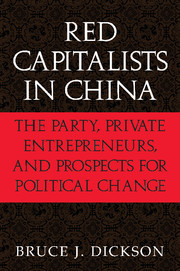Book contents
- Frontmatter
- Contents
- List of Tables
- Acknowledgments
- 1 Introduction
- 2 Challenges of Party Building in the Reform Era
- 3 New Institutional Links
- Appendix: Survey Design and Implementation
- 4 The Politics of Co-optation
- 5 The Political Beliefs and Behaviors of China's Red Capitalists
- Appendix: Multivariate Analyses of Political Beliefs of Officials and Entrepreneurs
- 6 Conclusion
- Bibliography
- Index
3 - New Institutional Links
Published online by Cambridge University Press: 29 August 2009
- Frontmatter
- Contents
- List of Tables
- Acknowledgments
- 1 Introduction
- 2 Challenges of Party Building in the Reform Era
- 3 New Institutional Links
- Appendix: Survey Design and Implementation
- 4 The Politics of Co-optation
- 5 The Political Beliefs and Behaviors of China's Red Capitalists
- Appendix: Multivariate Analyses of Political Beliefs of Officials and Entrepreneurs
- 6 Conclusion
- Bibliography
- Index
Summary
Social organizations should abide by the Constitution, laws, regulations, and the state's policy. They are not allowed to oppose the basic principles defined by the Constitution; endanger the state's unification and safety and national unity; damage the state's interests, public interests of society, and legal rights and benefits of other organizations and citizens; and go against social ethics and habit.
THE CCP's decision at the Third Plenum in December 1978 to abandon class struggle and to pursue economic modernization announced the beginning of the post-Mao reform era and the onset of the CCP's adaptation. These reforms led to profound changes in China's economy and society and consequently its politics. But it also set up a debate within the CCP between those who sought to protect party traditions and preserve their own positions on the one hand, and those who sought the party's adaptation to facilitate economic change, on the other. Although the end of class struggle and the onset of economic reform required the CCP to adopt new ways of organizing itself and interacting with society, many party stalwarts argued that these changes were undermining the party's ability to maintain order in China's political system. This desire to maintain party control while opening up the economy and society has bedeviled the CCP throughout the post-Mao era.
- Type
- Chapter
- Information
- Red Capitalists in ChinaThe Party, Private Entrepreneurs, and Prospects for Political Change, pp. 56 - 85Publisher: Cambridge University PressPrint publication year: 2003

